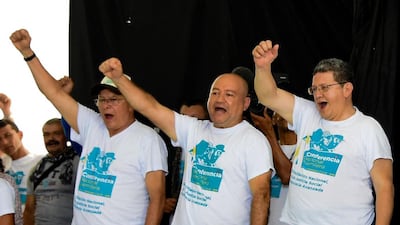YARI PLAINS, Colombia // Colombia’s Farc rebel group voted unanimously to approve a peace deal with the government and form a new political party, a top commander said on Friday at the close of a guerrilla congress on the southern Yari Plains.
After four years of negotiations in Havana, the government and the Revolutionary Armed Forces of Colombia reached a final peace accord last month that will end a five-decade war that has left a quarter of a million people dead.
As part of the agreement, the Farc will continue to push for social change as a political party, receiving 10 unelected seats in congress until 2026. The leadership of Farc have so far been coy on policy details but are expected soon to transition to a party rooted in Marxist ideals.
“The war is over, long live Colombia, long live peace,” said Farc commander Ivan Marquez in a statement to reporters alongside fellow members of the rebel leadership.
“We inform the country and the government and the governments and people of the world that the rebel delegates of the congress have given unanimous backing to the final accord.”
Colombians will vote on the peace accord in an October 2 plebiscite, the final go-ahead for rebels to demobilise. Polls show the accord will easily pass.
Two-hundred delegates from Farc units around the country gathered at the Yari site, five hours by rutted road from the nearest provincial town, to review the accord and discuss reorganisation in peacetime.
Although both leadership and rank and file fighters say they will prioritise political activism as civilians, the group has so far not provided examples of specific policies.
“Our initial platform is the implementation of the Havana accords,” said Pastor Alape, a member of the Farc’s secretariat and a negotiator at the talks in Cuba. “Our political proposals will have to come from the suggestions of our base.
“We started our political efforts clandestinely and now we aspire, legally, to open our initiatives, together with all sectors of society, to concretely cultivate the political space we are given,” he said.
The five-point peace accord covers agricultural reform, an end to the illegal drugs trade, victims’ reparations, Farc political participation and demobilisation.
The Farc may find an electoral foothold among poor farmers and committed leftists, but many Colombians are wary that ex-fighters will join gangs or a smaller rebel group, the National Liberation Army.
* Reuters

